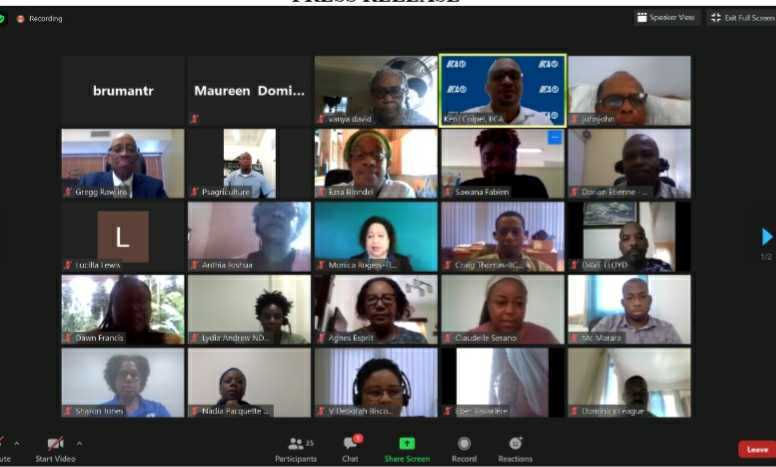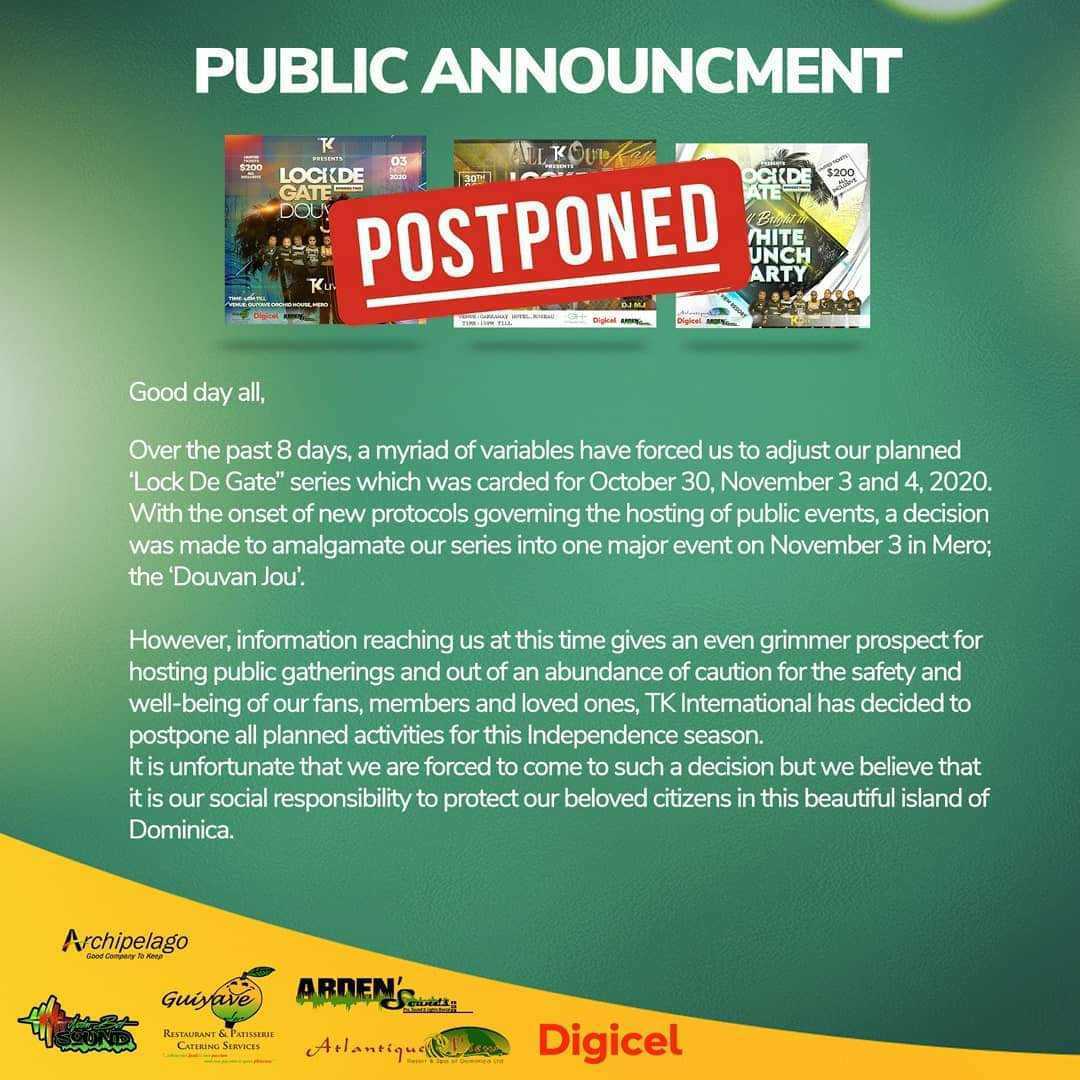
The Inter-American Institute for Cooperation on Agriculture (IICA) held a webinar on October 14, 2020 to launch the commencement of a component of disaster risk reduction project that emasises the role of women. That component, Output 2, entitled “Livelihood resilience strengthened in hazard-prone communities using gender responsive disaster risk reduction and sustainable livelihood approaches”, is part of the United Nations Development Programme (UNDP) project, “Strengthening Disaster Management Capacity of Women in the Cooperative Republic of Guyana and the Commonwealth of Dominica” funded by the Government of Japan. The objective of the project is to support hazard-prone communities, especially vulnerable groups – including women – in strengthening disaster and climate risk resilience towards enhancing sustainable livelihoods within such communities in Dominica and Guyana.
Output 2 of the project will be implemented in Dominica by IICA. According to the IICA Representative for the Eastern Caribbean States (ECS), Gregg Rawlins, IICA welcomes the opportunity to serve as implementing partner because, “Firstly, we recognize that this project is of great importance and significance to the Government of the Commonwealth of Dominica and it aligns very closely with the priorities established by the Ministry of Agriculture to build a resilient agriculture sector. Secondly, the activities of Output 2 align very well with the core competencies and technical programs of IICA and they also address the issue of women, which, for many years, has been a priority of IICA – seeking to support rural women in their activities. We see this as an opportunity to further engage with rural communities, particularly marginalized groups, including women in Dominica. Thirdly, the project complements, very well, other projects that we have in Dominica. These include current work to develop a policy for the agriculture sector, a policy that is grounded in building a strong and resilient agriculture sector. We also have recently signed a letter of agreement with the Partnership Initiative on Sustainable Land Management to implement activities under two GEF-funded, UNEP-executed projects. And [finally], the Caribbean Biodiversity Fund project, the Ridge to Reef Project, which focuses on nature-based solutions to climate change adaptation and resilience. These activities are all complementary and we look forward to seeing how we could best integrate these activities to have the most significant impact as possible, on the ground, in Dominica.”
UNDP Programme Analyst, Marlon Clarke, affirmed that “The project also encompasses Sustainable Development Goals 2, 5, 11, and 13, which focus on zero hunger, gender equality, sustainable cities and communities, and climate action, respectively.”
UNDP Gender Analyst, Ezra Blondel, emphasised the strategic focus of women in this project, stating that “the UNDP has recognized that women play a pivotal role in disaster management. However, their contributions are often taken for granted, often become invisible, and so their needs are not sufficiently factored in planning and implementation. Further, UNDP has recognized that any development – disaster management, no less – is incomplete without attention to the needs of all stakeholders.” Blondel drew on results of a recent baseline study, among 280 farmers across three parishes, and levied specific attention to value chain and microfinance.
In terms of agriculture value chain and differences in number and type of crops grown, Blondel said “women report to grow no less than 66 different crops and men no less than 61. The crops that seem to be gender-specific at the time of the survey, for the female farmers include cassava, saffron, sweet sop, custard apple, squash, tangerine, golden apple, string beans, toloma, gooseberry, and sugar apple. For the male farmers, the crops that they grow are breadnut, cush-cush, kennip, nutmeg, and pomegranate.” These disparities were also evident in the microfinancing component of the study. Blondel said, “a higher percentage of male farmers applied for loans than female farmers. The applications for male farmers have also been more successful. 24 % of male applications have been successful compared to 4 % of female applications, being six times more successful than women. Almost half the women in the survey reported that they do not require a loan, almost twice that reported by male farmers. This survey confirms the gender gap in access to finance.”
In his presentation, Technical Specialist of the IICA Delegation in Dominica, Kent Coipel, highlighted that “while the focus is on women, the emphasis is not just to develop businesses but to really integrate the whole issue of gender responsiveness as well as looking at approaches that will build the resilience in terms of climate events and other factors that will affect the sustainability or the issues relating to the livelihoods of these vulnerable groups.”
Permanent Secretary in the Ministry of Blue and Green Economy, Agriculture, and Food Security, Dr. Reginald Thomas, affirmed that the project allowed the Ministry to address key challenges in agriculture. “We saw this as an opportunity to deal with some of our key challenges that we saw post [Hurricane] Maria; that is, the inequality as it relates to gender and the impact of women in the sector that many times go unnoticed, the issue of rural livelihoods being impacted by storms and other climate change events, and the issue of micro-finance – how vulnerable groups are able to access and use resources to maintain their livelihoods. When we saw the outputs of this project, we became very excited. We also saw these as a pathway towards the attainment of the SDGs.” PS Thomas also attested to the years of service and expertise IICA has provided to the Ministry. He said, “IICA, as an institution, has been with us for a number of years and we have benefitted from the expertise of IICA and from the cooperation from this very strong institution. I believe that IICA has tremendous expertise, of which the Ministry needs to tap into – IICA local, IICA regional, and the hemispheric component of IICA.”
The implementation of Output 2, of which IICA is responsible, is expected to achieve three main areas of results: (i) agricultural value chain analysis and support; (ii) microfinance analysis and development; and (iii) capacity building in climate smart agriculture. The project will be implemented in the parishes of Saint Paul, Saint David, and Saint Patrick, with a duration of one year.
About IICA
IICA is the specialized agency for agriculture in the Inter-American system, with a mission to encourage, promote and support its 34 Member States in their efforts to achieve agricultural development and rural well-being through international technical cooperation of excellence.






